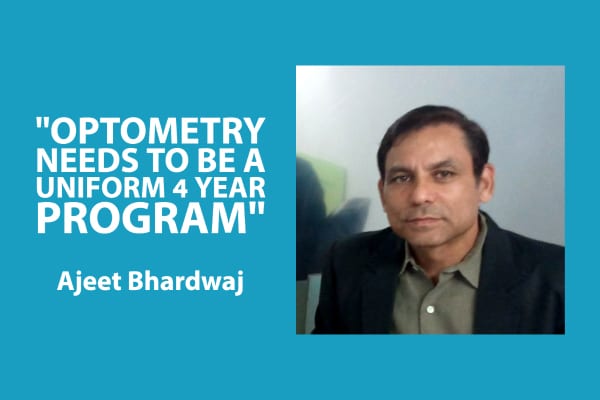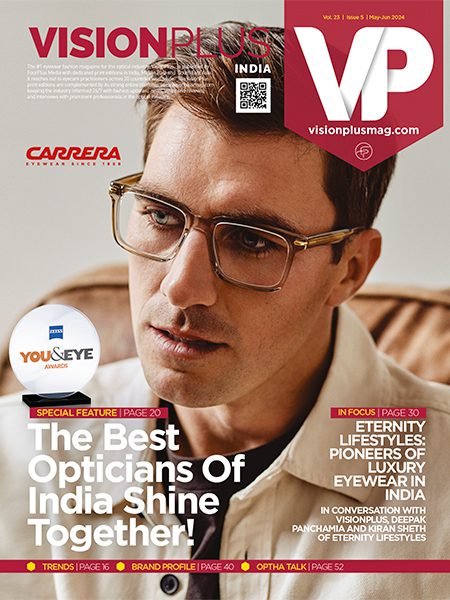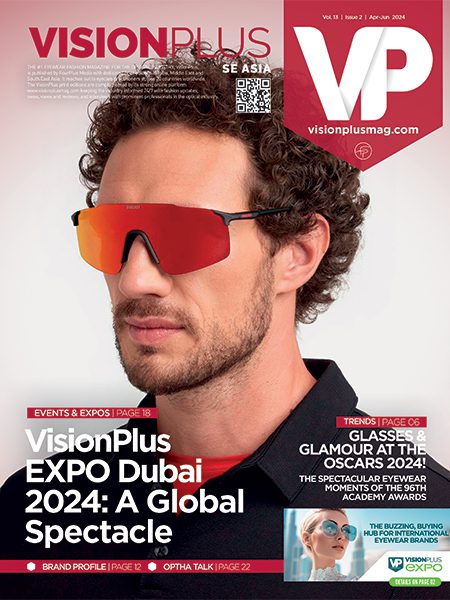Optometry Needs To Be A Uniform 4 Year Program
Ajeet Bharadwaj shares his journey as an optometrist.
Diploma in Optometry was started in 1958 primarily for management of refractive error. Though many diploma holders were employed under the National Blindness Control Program in many states but in my experience most of the diploma holders were not allowed to refract in private sector jobs with Opticians till the late 1990s.
Till the late 80s most refraction work was done by ophthalmologists in metro cities. Most ophthalmologists visited different optical shops at different times and provided prescription of glasses and dispensed contact lenses. When I completed my degree and was looking for a job and visited many optical shops, most opticians clearly declined saying that Optometrists did not know how to refract and had very poor communication skills in both English and Hindi and they preferred ophthalmologists to visit them.
My Personal Journey
I recall my visit to Himalaya opticals way back in 1980 for a job in their Defence Colony branch and met Mr. Binani and he told me that they had 4 Ophthalmologists visiting them at different times and they did not need the services of an optometrist for refraction work. Finally I joined Bon ton opticians at Janpath with a condition that I would have to leave the eye clinic during their ophthalmologists visiting time of 11 am to 1 am.
After joining, I learnt that they also had a diploma holder in optometry working with them since the last 6 years who was just able to mark axis and supervised their optical dispensing lab and were not allowed to examine patients . Most opticians in Delhi used diploma holders for this work only because of their poor communication skills in English as well in Hindi.
Trends in optical practices changed in late 1980, More and more degree holders with better communication skills joined independent optical outlets and started prescribing glasses and contact lenses and the trends changed. All leading opticians opted for a full time optometrist and it became a norm in the industry.
Many of these degree graduates joined optometry schools as teaching faculty and this helped in improving the quality of teaching and helped in improving the quality and competencies of diploma holders over a period of time.
With my 45 years experience in this industry I observed that most diploma holders were very skilled in the art of refraction and very quick in their job probably due to their good maths background. However most of them had poor understanding of anatomy and physiology of the eye. They had no idea of refractive error correlation with anomalies of binocular function and its relation with accommodation and convergence.
They could prescribe the best pair of spectacle lenses to individual eyes, but when it came to binocular vision they had no understanding of how a final prescription needed to be fine tuned binocularly .
Representing World Council Of Optometry
World Council Of Optometry has a membership of over 150 member country’s optometry associations. The Indian Optometry Association has been a member of WCO for the longest period.
I am the only Indian who was elected as President of Asia Pacific Optometry council and inducted into the Governing Board of WCO and World Optometry Foundation . Asia pacific is a very prestigious region and has 26 countries under it including Australia and New Zealand. Many countries in our region had advanced to an 8 years OD program by then.
As President I was invited to many countries of the region and world to address Optometry groups and their members Association. With my three years degree qualification I always had that inferiority complex inside. Your colour of skin and your lower duration of qualification can pose lots of questions about your credibility to be heading an important and vast Asia pacific region as President.
It is always a challenge to overcome that education bias. Our WCO boards always had this discussion that Optometry in India is a diploma and 2 years program and that too is not legislated and regulated while the rest of the world was moving to OD ( Doctor of Optometry ) as standard education for Optometry.
To get over this hurdle and build my inner confidence I upgraded myself to the M Optom program. I travelled every weekend to Mumbai for 2 years. This gave me self confidence and personal satisfaction and since then we worked towards upgrading our minimum optometry qualification to a four year program to change the image of optometrists from India.
The Future
Global recognition of Indian Optometry qualification is of utmost importance to us and our lawmakers . India being a young country has an aspiration and potential to meet the global health and eye care needs of the world.
India has the human resource potential to reach out to the world .Our Optometrists with our internationally recognised qualification in a regulated and legislated system will be able to seek employment in the rest of the world with much ease. All countries where the profession of Optometry is regulated and legislated Optometry have a minimum four year degree program and many of these have advanced to O.D program and India must have the uniform International education standards.
It is pertinent and important that in the near future we adopt a uniform and global degree of OD (Doctor of Optometry) so that our Indian Optometrists are not discriminated for their lower duration of training and they can seek employment in countries of need. Till then the minimum 4 year degree program should be a must for every optometrist .
Optometrists can get better remuneration and higher pay scale with increased duration of training. Our State Optometry Associations need to work with state Governments so that employment rules are upgraded from diploma program to minimum of four years degree program in state health jobs .
Education is strength and the only way to advance a profession and to bring efficiency and an eye care delivery system for better eye care delivery to citizens of India and globally.
And after having said all of this I would like to reiterate that for independent Optometry practice, a four year regular institutional degree program should be a minimum program for safer eye health delivery.






